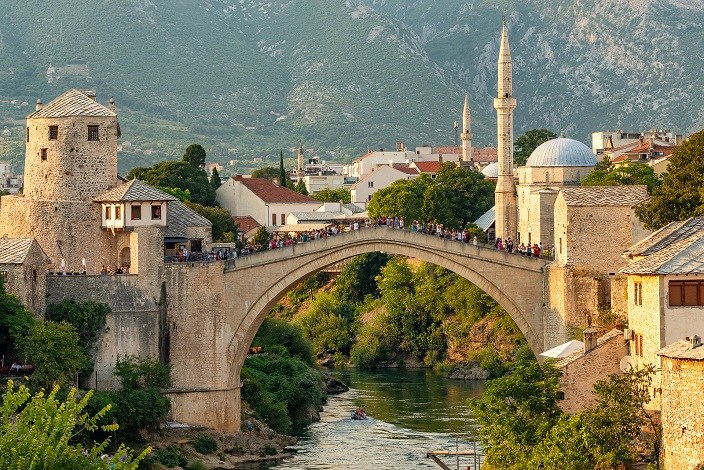High Representative Valentin Inzko, the top international official in the country, imposed a law that drew the ire of the Bosnian Serb strongman Milorad Dodik. The National Assembly of the majority-Serb Republika Srpska, one of two regions comprising the state of Bosnia, unconstitutionally annulled Inzko’s decision, and Dodik threatened to pull out all Bosnian Serbs from the state-level institutions permanently: “We will withdraw from all state organs and we will not return to them anymore.”
He has been vocal about his support for an independent Republika Srpska, and has vowed to bring what he calls “stolen competencies”— competencies accorded to the state — back to it.
An official document adopted by the Srpska National Assembly enumerated that these include the state tax authority, the state judiciary, and the state-level police agency, and tasked the assembly with unconstitutionally returning them to the region. Perhaps most alarmingly, Dodik has railed that the joint Armed Forces should be dismantled ostensibly to demilitarize Bosnia, but has hinted at creating his own. Meanwhile, the state Council of Ministers under the leadership of a Dodik ally has been drifting in and out of coma, rendering any domestic response impractical, and an international response inevitable.
The US and the EU, however, have chosen to initiate talks on constitutional reform in the country rather than engage in a meaningful response to Dodik’s threats. International media, such as the Guardian and the New York Times, have written about possible violence ensuing ahead of general elections, and many analysts have already called it the “worst political crisis since the end of the war”.
The keen observer of Bosnian politics will say that that summary sounds about right. What most will not realize is that I’m describing the year of 2009. And that is because every single sentence — even Dodik’s quote — is true for 2021 as much as it is for 2009.
So was the crisis of 2009 resolved and, if so, how? Well, it was and it wasn’t. Obviously there was no war in Bosnia in early 2010s. The 2010 general elections did, however, bring Dodik and his party everything they had ever wanted. It was a landslide described by a close associate of Dodik as the party’s “most brilliant victory since its founding”.
But the underlying crisis never went away. Who can forget the events of 2011 when Dodik threatened to withdraw all Serb representatives from state institutions permanently and secede, and the EU stepped in by arranging talks on his demands — described as “the worst crisis since the end of the war.”
That every other year analysts rush to declare political crises in Bosnia as the worst ever tells us less about those crises than it does about the nature of the country’s ethnically-divided system and Dodik’s aptitude for exploiting it.
The questions of why Dodik didn’t secede in 2009, and why he won’t do so now still loom large. Incidentally, a report by the Crisis Group dated 12 years ago offers a common-sensical explanation that still holds: As long as the costs of a failed secession greatly outweigh the benefits of a successful one, Dodik will not pull the trigger.
One would be hard put to argue why Dodik would prefer a little Belarus anyway — shunned from most of the international community and even less economically viable, relying on cash-strapped Serbia for assistance, which already finances parallel Serb institutions in Kosovo — over the current highly-decentralized setup.
Rather than being a sign of impending war, the latest iteration in Dodik’s staged show is yet more evidence that the crisis machine works as intended. The crises themselves are a permanent feature of Bosnia’s power-sharing system. The ample institutional and informal mechanisms to block normal democratic functioning in the name of ethnic interests lend themselves easily to producing a crisis where there is none in order to attain personal goals.
Dodik’s actions in 2009, for example, were widely attributed to an investigation by the state police agency implicating him in the embezzlement of €74 million from construction projects, which was subsequently dropped. The only thing threatening his rule now seems to be his own electorate.
If you find the Crisis Group’s explanation too glib, or the notion that Dodik’s actions are just party politics too naïve, and prefer to take him at his word, here is what he had to say of the possibility of war: “Who would fight? With what? Violence in Bosnia is possible only if NATO sits and does nothing to prevent such a scenario.” That’s actually Dodik from 2009 again. Here he is in 2021 saying the same thing with childlike simplemindedness: “If anyone makes a military move, it would be best if NATO says that they would blow them up with a rocket.”
Clearly, Dodik is reading from the same script again. It would be unreasonable to expect a different denouement.
However tempting it might seem, Western powers should refrain from throwing Dodik a lifeline as they did before. Be that as it may, a sustainable transformation of the country’s divided system can only come from within. Unfortunately for Bosnia, that means things will most likely get worse before they get better.


